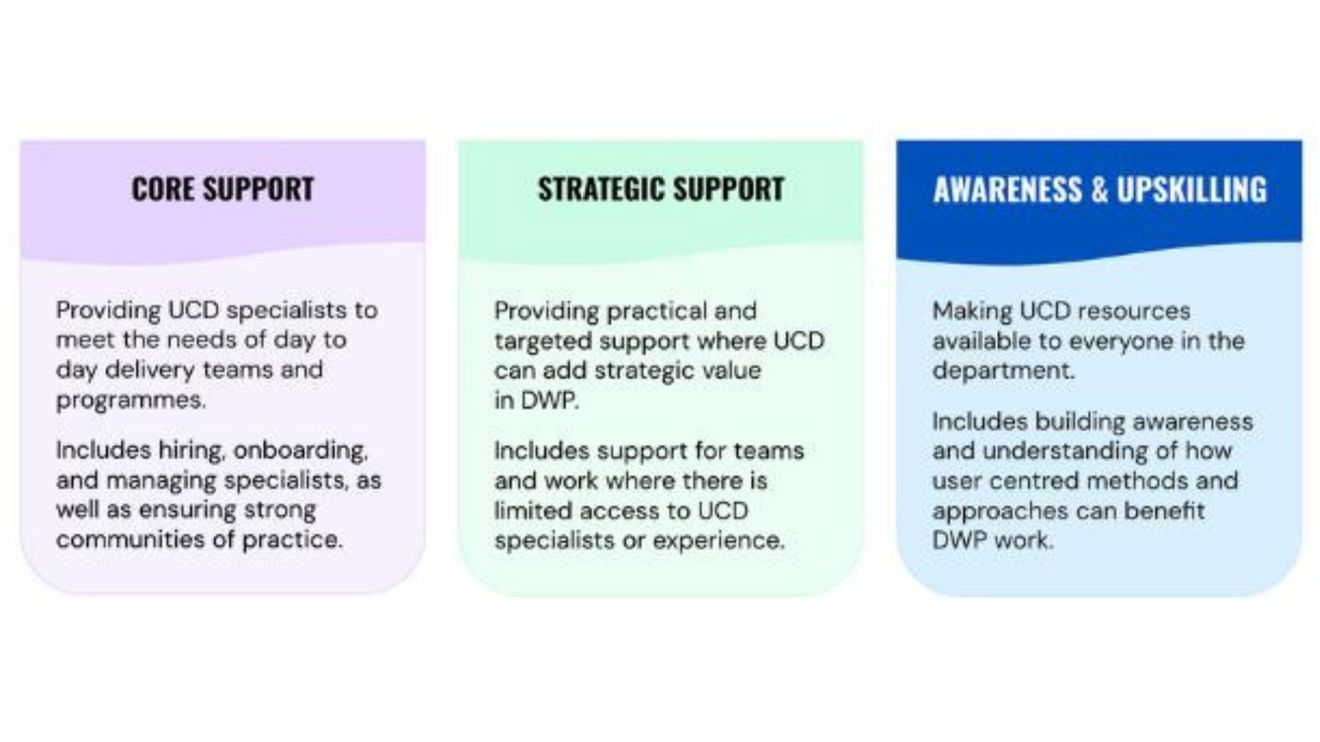There’s been significant investment in User Centred Design (UCD) as part of government programmes over the past decade. Skill sets and roles have been professionalised as part of the Digital, Data and Technology Profession Capability Framework (DDaT), supporting how government departments work to the government service standard and deliver transformation.
Across central government, in departments, agencies and arms length bodies of all sizes, there are now established and growing UCD practices.
At DWP, the largest UK government department, building capacity, capability, community and ensuring standards, has always been the core focus of the UCD practice. But in 2023, supported by TPXimpact, work was started with the intention of increasing the impact and reach of UCD work.
Together with DWP’s Heads of User Research, Interaction Design, Service Design and Content Design, we’ve been working through how to strengthen the offer of UCD into the department. Not just within DWP Digital, but also across the wider organisation to help deliver better products and services which meet user needs.
The problem with User Centred Design in DDaT
DWP is a good reflection of how the UK government has been successful in creating, hiring and retaining large numbers of specialist design and research roles to support transformation and service delivery work. But there are challenges with how design and research specialists are deployed and managed, and especially with how organisations fully realise the value of their experience and skills.
UCD Heads of Practice in departments like DWP (referred to here as Head of Roles) are expected to provide and manage large teams of UCD specialists. They and their immediate reports can spend significant amounts of time on recruitment, team management and community support. This is often highly reactive work to meet the demands of their organisations.
Many UCD teams in government have therefore become overloaded servicing a supply-and-demand operating model for skills and specialist roles. Alongside ongoing challenges of meeting recruitment demands, this leaves little space and time for Head of Roles to offer more strategic leadership and influence.
The opportunities for User Centred Design to add more value
Where there’s now considerable UCD knowledge and skills inside government the opportunity is to extend the impact and reach of user centred approaches.
Working in DWP, we’ve both seen the strong interest from teams wanting to learn about how design and research can help deliver good outcomes in their work. But people often don’t know where to start, or how to access the type of specialist support they might need.
To start to consider how UCD can add value, we can look at common approaches and methods, such as:
- understanding different types of user needs: Using research tools and methods to understand the needs of service users, professionals, and stakeholders in a system,including the needs of other civil servants and staff in our organisations.
- framing policy challenges or problem spaces: Learning how to ask the right questions to frame the problem, bringing user focus, and also knowing how to work creatively within work constraints.
- visualising systems, services, or journeys: Introducing approaches for visualising how services and systems work now, and visually representing and exploring how they could work in the future.
- rapid ideation, prototyping and testing: Introducing approaches for rapidly creating and exploring new ideas. Including the ability to create working prototypes that enable people to directly interact and feedback on solutions.
All of these approaches can bring increased user perspective and insight to the work of teams across a government department. This includes digital and technology work, but can be just as valuable in areas such as policy and operations.
These are approaches that can be easily shared, supported and built upon as capabilities in any type of team. Designed in the right ways, they can also be used by people with different levels of experience and confidence to support work with and without access to UCD specialists.
Developing User Centred Design as a service
When we first spoke about this work, Fay had a clear vision about repositioning UCD ‘as a service’ in DWP. As a Deputy Director in the department, she had observed the growing interest in design and research approaches, especially from a broader range of areas of the department wanting to interact with UCD support.
Starting work together with Fay’s DWP UCD practice team in February 2023, we agreed the following goal:
“To enable and support design and research activities wherever there are opportunities for DWP to be more user centred in how it works.”
We wanted to look at how we could shift the UCD practice from being a managing function – an area that was reactive and just keeping up with operational demands – to becoming more of an enabling function – an area that would be able to act more strategically alongside its core delivery support offer.
The UCD as a service model
To develop the idea of UCD ‘as a service’, we explored a new operational model, roles and offers for DWP’s UCD practice.
This is split into three areas of focus:
- Core support
- Strategic support
- Awareness and upskilling.

A key question for developing UCD as a service was how to optimise an operating model to be able to offer services beyond time consuming ‘core support’ – including recruitment, delivery and people support functions.
In response to this we proposed a new UCD operational model with a shared support function and roles – covering learning and development, community and engagement, and capacity management and recruitment. This is intended to free up more time for Head of Roles and Practice Leads to focus on strategic, practical and targeted support in the department.
The final part of UCD as a service then focuses on the needs to help people understand UCD, and to share design and research skills more widely in the department. The DWP team agreed that there were gaps in supporting resources, and training materials they needed to develop here.
Defining and testing strategic User Centred Design support
Focusing specifically on the strategic support part of UCD as a service, we captured and agreed upon types of targeted work approaches that could be offered more widely in the department.
These included:
- problem-definition sessions – for example, identifying and agreeing shared goals through holding one or two workshops with key stakeholders
- policy discovery – for example, two to six weeks focused on a policy question to inform strategy decisions
- service discovery – for example, one to four weeks focused on mapping a whole or part of a service landscape or journey – connecting work across digital, operational and policy areas
- design sprints – for example, rapid prototyping, ideation, learning in a problem space, 5-10 days
We agreed to test and learn from some of these newly defined offers, and we also found past examples of strategic UCD support being delivered successfully in DWP. These included design sprints with policy teams, and cross-government collaboration.
In April 2023, we prioritised five workstreams, each led by a DWP Head of Role with support from a TPXimpact Design Lead:
- Providing support for strategic planning and prioritisation
- Collaborating in policy and delivery spaces
- Exploring approaches to using design sprints
- Developing materials to support awareness and build understanding of UCD
- Finalising the future operating model – with the priority to agree alignment and support how this change was managed
These workstreams were then delivered and evaluated over ten weeks of work, with this evaluation feeding back into ongoing work now owned by the DWP team.
Next steps
This work has provided insight into some of the wider challenges for UCD in government. It’s also highlighted how UCD practices can act more strategically in how they create and deliver value through their work.
The UCD as a service model asks that UCD practices act more responsively like in-house agencies, rather than predominantly resource management functions.
The importance of this work is that government organisations, including DWP, will continue to attract skilled UCD specialists, and retain the ones they already have, especially as specialists are able to contribute in more strategic and broader ways that make full use of their experience and skill sets.
Interested in learning more about this work, or working on similar initiatives?
Get in touchOur recent design blog posts
Transformation is for everyone. We love sharing our thoughts, approaches, learning and research all gained from the work we do.
-

-

Naming services in complex situations
Read blog post -

Using inclusive research approaches with Blood Cancer UK
Read blog post -

Designing for users who don’t exist (yet)
Read blog post


